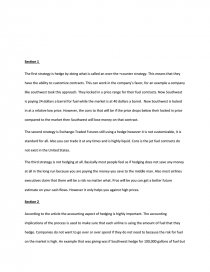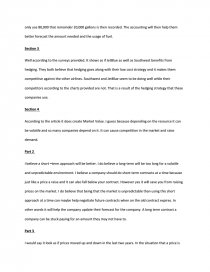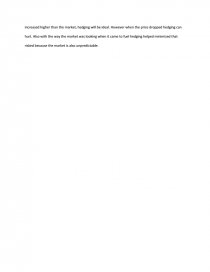Jet Fuel Hedge Case Study
Essay by nastylupe • February 28, 2017 • Coursework • 634 Words (3 Pages) • 972 Views
[pic 1][pic 2][pic 3]
Section 1
The first strategy is hedge by doing what is called an over-the –counter strategy. This means that they have the ability to customize contracts. This can work in the company’s favor, for an example a company like southwest took this approach. They locked in a price range for their fuel contracts. Now Southwest is paying 24 dollars a barrel for fuel while the market is at 40 dollars a barrel. Now Southwest is locked in at a relative low price. However, the cons to that will be if the price drops below their locked in price compared to the market then Southwest will lose money on that contract.
The second strategy is Exchange-Traded Futures still using a hedge however it is not customizable, it is standard for all. Also you can trade it at any times and is highly liquid. Cons is the jet fuel contracts do not exist in the United States.
The third strategy is not hedging at all. Basically most people feel as if hedging does not save any money at all in the long run because you are paying the money you save to the middle man. Also most airlines executives claim that there will be a risk no matter what. Pros will be you can get a better future estimate on your cash flows. However it only helps you against high prices.
Section 2
According to the article the accounting aspect of hedging is highly important. The accounting implications of the process is used to make sure that each airline is using the amount of fuel that they hedge. Companies do not want to go over or over spend if they do not need to because the risk for fuel on the market is high. An example that was giving was if Southwest hedge for 100,000 gallons of fuel but only use 80,000 that remainder 20,000 gallons is then recorded. The accounting will then help them better forecast the amount needed and the usage of fuel.
Section 3
Well according to the surveys provided. It shows as if JetBlue as well as Southwest benefits from hedging. They both believe that hedging goes along with their low cost strategy and it makes them competitive against the other airlines. Southwest and JetBlue seem to be doing well while their competitors according to the charts provided are not. That is a result of the hedging strategy that these companies use.
Section 4
According to the article it does create Market Value. I guess because depending on the resource it can be volatile and so many companies depend on it. It can cause competition in the market and raise demand.
...
...



